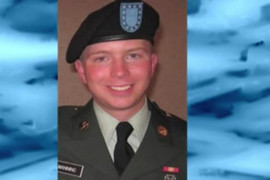
Bradley Manning has been indicted by the United States government for exposing war crimes being committed in Iraq by the Pentagon. He is being used as a scapegoat for the failure of the U.S. in the war. a photo by Pan-African News Wire File Photos on Flickr.
March 11, 2011
Obama Defends Detention Conditions for Soldier Accused in
WikiLeaks Case
By SCOTT SHANE
WASHINGTON — President Obama has defended conditions in a Marine Corps jail for Pfc. Bradley E. Manning, who is accused of leaking classified government documents to WikiLeaks. The president said Friday that he had been assured that such measures as forcing Private Manning to sleep without clothing were justified and for his own safety.
“With respect to Private Manning, I have actually asked the Pentagon whether or not the procedures that have been taken in terms of his confinement are appropriate and are meeting our basic standards,” Mr. Obama said at a news conference. “They assure me that they are.”
“I can’t go into details about some of their concerns,” he added, “but some of this has to do with Private Manning’s safety as well.” He appeared to be referring to fears that Private Manning might harm himself, though the private, his friends and his lawyer have all denied that he is suicidal.
The question to Mr. Obama was prompted by critical comments from Philip J. Crowley, the top State Department spokesman, about Private Manning’s treatment. In a talk at M.I.T., Mr. Crowley called the treatment “ridiculous, counterproductive and stupid,” and he said he did not understand Defense Department officials’ reasons for imposing it, according to people present. Mr. Crowley later said he was expressing his personal views.
Starting on March 2, Private Manning was forced by guards at the Marine Corps brig at Quantico, Va., to sleep without clothing at night, though he has a blanket and in recent days has been given a “tear-proof smock” to wear at night, according to a Defense Department spokesman, Col. David Lapan.
“Pfc. Manning is being treated fairly, with dignity and respect,” Colonel Lapan said. “All measures in place are to ensure his safety and security.”
A document made public on Thursday by Private Manning’s lawyer, David E. Coombs, said the nighttime stripping began as a result of a sarcastic quip from the imprisoned soldier about concerns that he might kill himself.
On March 2, a brig officer had told him his treatment would not change because “the brig simply considered me a risk of self-harm,” Private Manning wrote in the document, which was filed as part of a formal complaint to military officials. “Out of frustration, I responded that the POI restrictions were absurd and sarcastically told him if I really wanted to harm myself, I could conceivably do so with the elastic waistband of my underwear or with my flip-flops.” The initials refer to “prevention of injury,” a status that restricts items in Private Manning’s cell and requires guards to check him constantly.
Private Manning’s lawyer and supporters have complained for months about his conditions, which they describe as effectively solitary confinement, since he is kept in his cell 23 hours a day and has almost no contact with other detainees.
Brig officials have said he is not in solitary confinement but is being treated as required for prisoners classified as “maximum custody” and placed on prevention-of-injury watch. Private Manning’s lawyer has challenged both designations as unjustified.
According to Private Manning’s written account, a brig psychiatrist recommended continuing the prevention-of-injury status for Private Manning in December, but in January decided it should be ended, a recommendation ignored by brig commanders. After the March 2 incident, the psychiatrist assessed Private Manning as “low risk,” the document says.
Private Manning was arrested last May and accused of downloading several hundred thousand diplomatic cables and classified reports on the wars in Iraq and Afghanistan and providing them to WikiLeaks, the anti-secrecy group. If he is convicted of the charges at a court-martial, he could face life in prison.
No comments:
Post a Comment